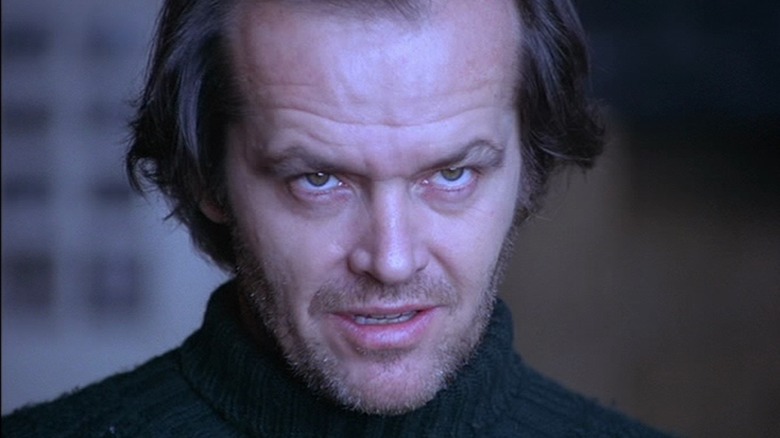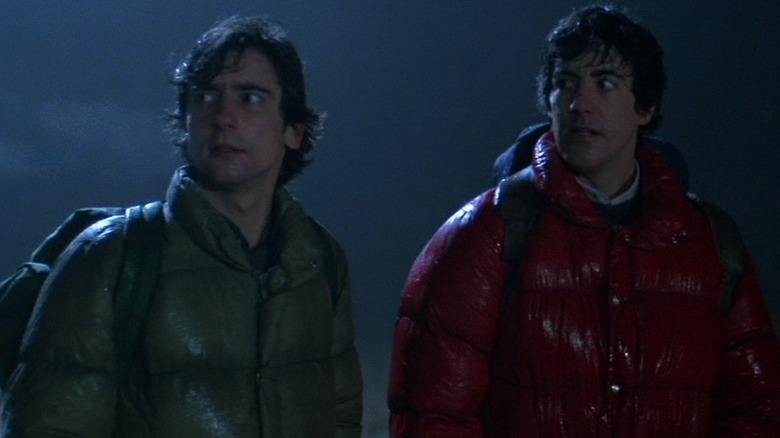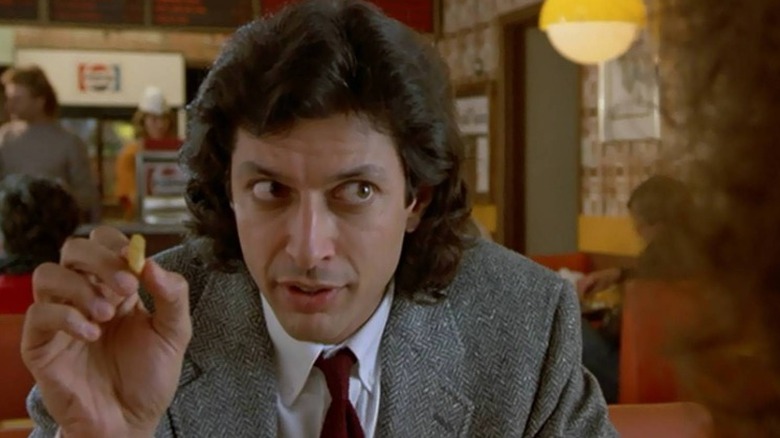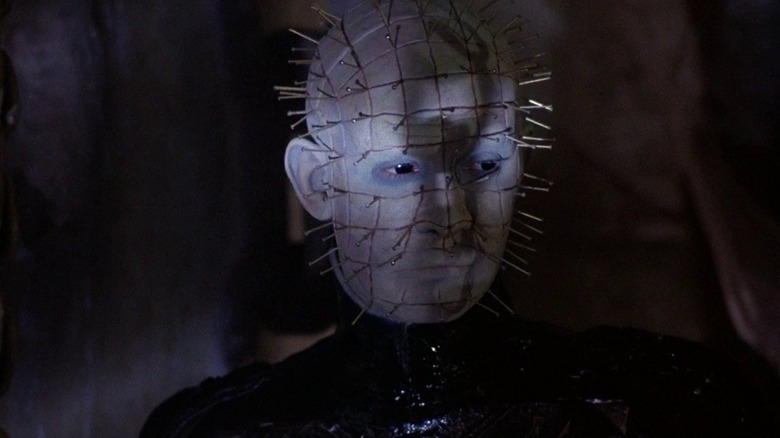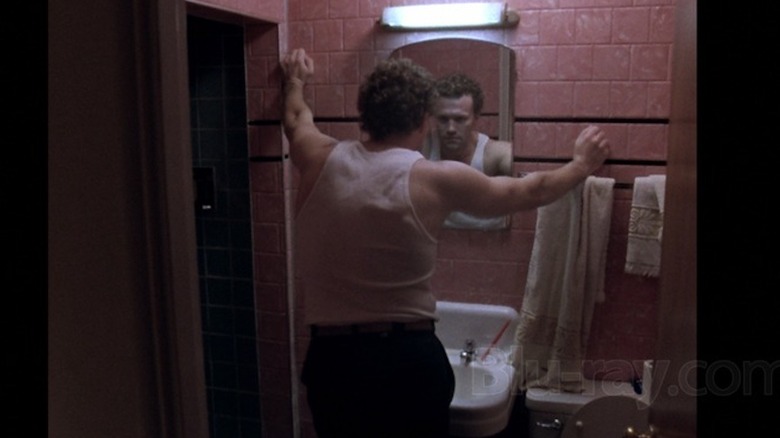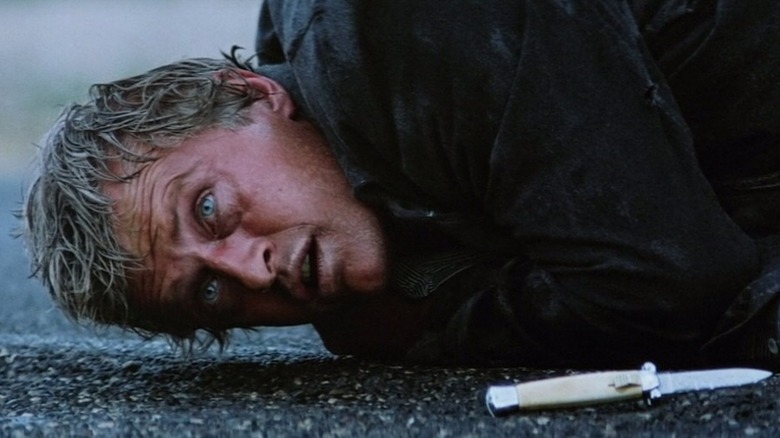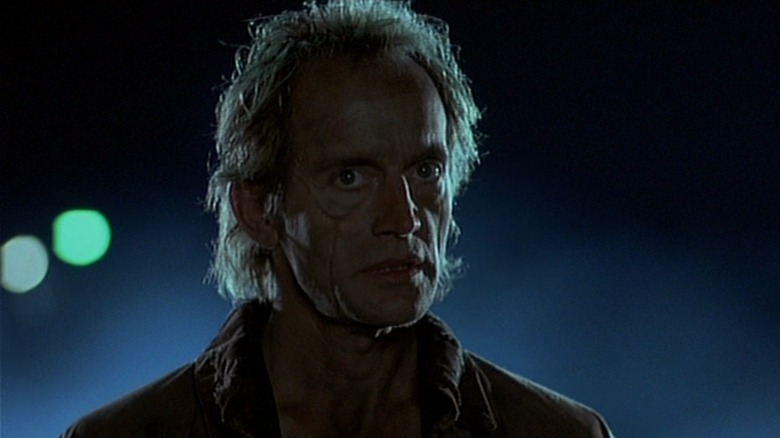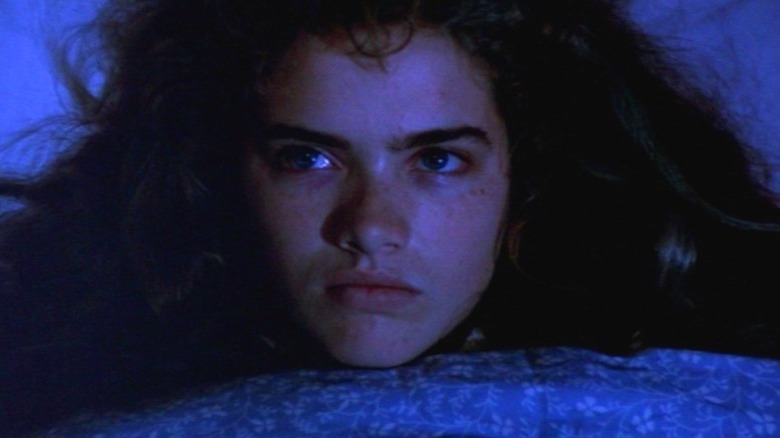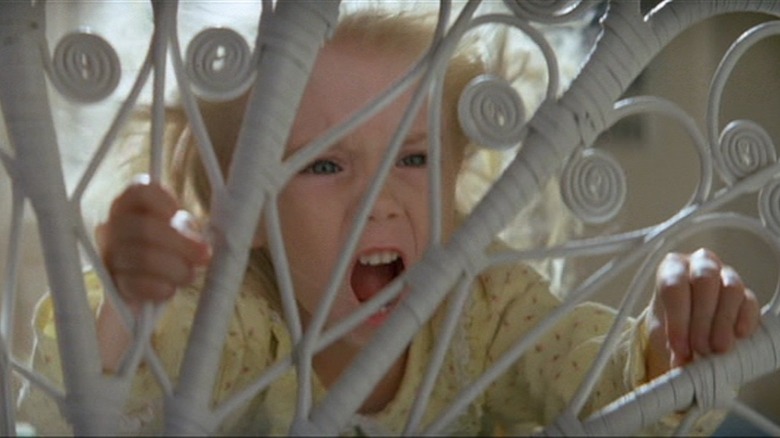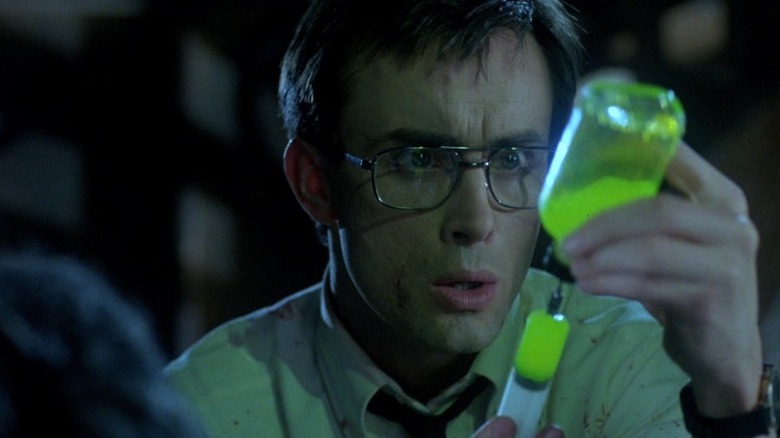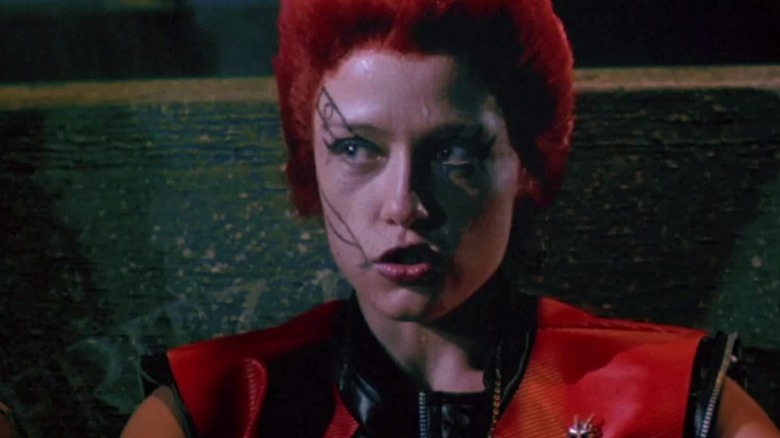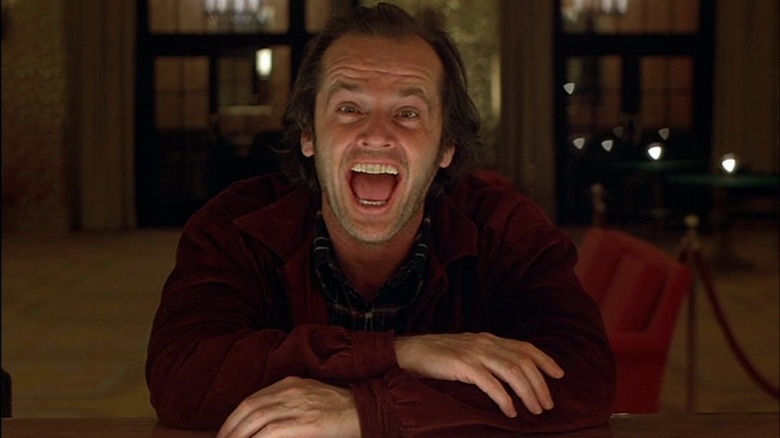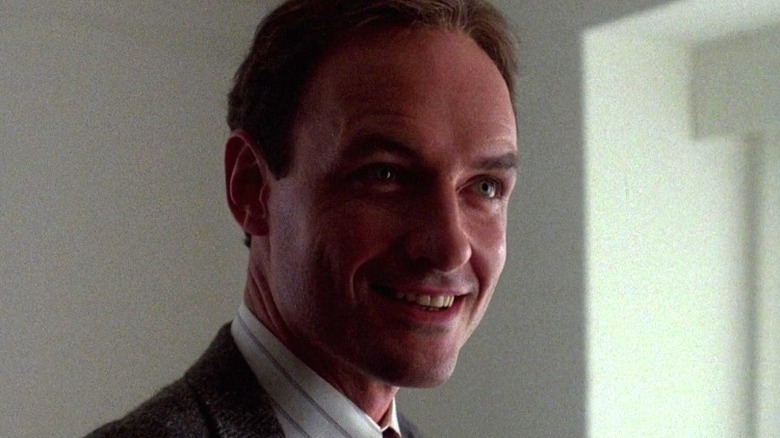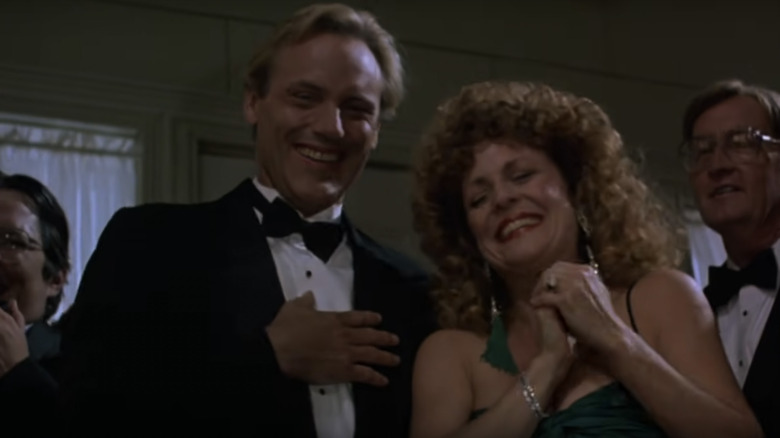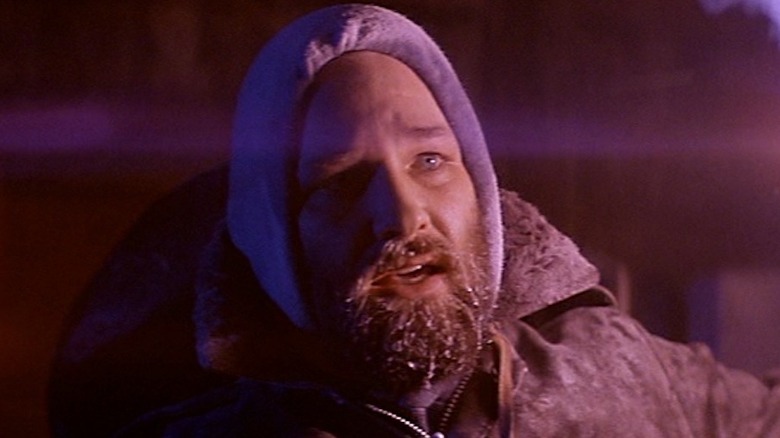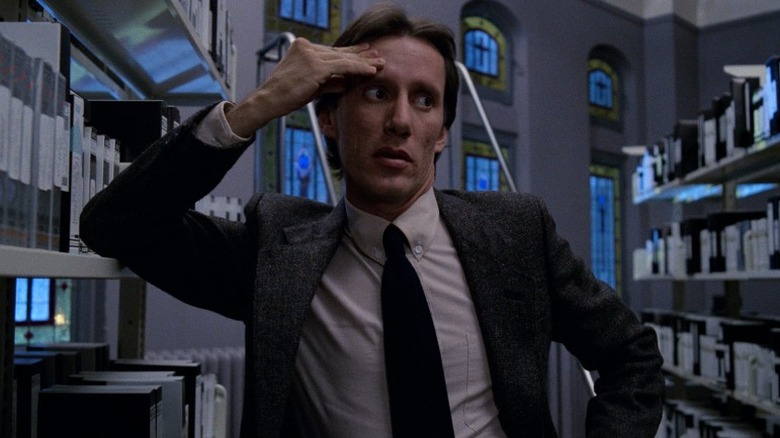'80s Horror Movies You Need To Watch
The '80s were a fantastic time to be a horror fan — but it's easier to see that in retrospect. As Inside Hook points out, those years inundated the genre with lackluster sequels, so the sheer volume of horror movies might have made it hard for fans to separate the best from the rest. But now that decades have passed and critics and horror fans alike have spoken, it's easy to see which movies have lasted. The only hard part of making this list was narrowing it down.
While '70s horror movies were fairly low-key — offering up a wide variety of sophisticated, unsettling masterpieces — the '80s took a different approach that we like just as much. Many of our favorite movies from this decade turn the volume up high, getting garish, weird, gross, and funny ... often all at the same time. This was one of the great times for horror-comedy, body horror, and practical creature and gore effects, while the quiet, realistic exceptions to that blood-spattered rule are equally great. Our must-see horror films of the '80s are a win-win for everyone.
An American Werewolf in London
"An American Werewolf in London" manages the neat trick of being both scarier and funnier than you might think at first glance. That alone might have already put it on our list, but it also packs in extraordinary, groundbreaking special effects, resulting in probably the best-looking werewolf transformation we've ever seen on screen.
Feckless American backpackers David (David Naughton) and Jack (Griffin Dunne) make a bad mistake when — despite ominous warnings — they stray out onto the moors. Suddenly, an enormous, vicious creature is tearing into them, killing Jack and changing David's life. By the time David wakes up from the resulting coma, he's already doomed: As Jack's undead spirit (his rotting body is another great effect) helpfully informs him, he's now a werewolf himself. And his death may be the only thing that can bring him and his victims any peace.
Wrap this cynical tragedy up in some dark humor and entertaining culture clashes, and you have the singular "An American Werewolf in London."
The Fly
David Cronenberg's visceral, grotesque, and gooey masterpiece is one of the best looks at disease and physical decline we can imagine. We may not all be experimenting with risky teleportation devices that could malfunction and blend our DNA with a housefly's, but we do all have reason to fear sickness and decay. That's what "The Fly" is about.
Seth Brundle (Jeff Goldblum) is a little off-kilter, sure, but he's charismatic and likable, and he quickly develops a warm and loving romance with journalist Ronnie (Geena Davis). But none of that can save him from the slow mutation that takes over his body after an accident with his experimental telepods. He begins to become "Brundlefly": His fingernails fall off, he starts to vomit acid, and he oozes sticky secretions. It's hard to watch, but the plot is so gripping that we can't look away — especially once his mind starts to deteriorate and he becomes a danger to Ronnie and their unborn child.
"The Fly" is engaging, terrifying, and unforgettable. It might make you gag, but it's worth it.
Hellraiser
The sinister, offbeat "Hellraiser" introduced a new and edgier eroticism into the horror genre. It opens with the amoral pleasure-seeker Frank Cotton (Sean Chapman) acquiring a mysterious puzzle box that he would have been better off not solving: What comes out of it tears him apart and drags him away to experience unbelievable pain.
The story then turns to Frank's young niece, Kirsty (Ashley Laurence), and the troubled relationship between her father Larry (Andrew Robinson) and stepmother Julia (Claire Higgins), who have recently moved into Frank's now-empty house. A little bit of Larry's blood on the floor is all it takes to kick-start Frank's resurrection — and since he and Julia were previously involved in a passionate love affair, she's all too willing to commit murder to give him a steady supply of life-giving blood. Worse, an unsuspecting Kirsty has solved the puzzle box and summoned the otherworldly Cenobites, who want to take her back to their realm of agonizing sensory extremes. Kirsty manages to trade her knowledge of Frank's return for the possibility of her own safety, but it's far from clear that the Cenobites will hold up their end of the bargain.
"Hellraiser" is one of the best looks at how horror offers its own kind of allure, and it's full of great lines and memorable images.
Henry: Portrait of a Serial Killer
Horror movies are rarely as grim and unsettling as 1986's "Henry: Portrait of a Serial Killer," a pessimistic and all-too-realistic film that will leave you feeling like you're covered in a thin layer of grime.
The movie is based on the confessions of the real-life Henry Lee Lucas, and although many of Lucas' claims were ultimately unverified, spurious, or downright impossible, that sense of reality remains. This is a thoroughly deglamorized serial killer movie, where Michael Rooker's Henry has none of the gentlemanly charm of a Hannibal Lector. He's aimless and dispassionate, and his intelligence is turned mostly towards keeping himself from getting caught. He teams up with the more-disorganized Otis (Tom Towles), but their partnership is destined to have a short and ugly end: Otis indulges in the kind of sexual violence that repulses Henry, and his fragile sister, Becky, is drawn towards Henry as the best of all her bad options. None of this is going to turn out well.
"Henry: Portrait of a Serial Killer" features some great acting, especially from Rooker, and it's a smart, psychologically subtle film — but viewers should know going in that it's also an exceptionally brutal one.
The Hitcher
If horror movies teach us anything, it's never to pick up hitchhikers. And no film has ever seared that into our brains as well as 1986's pitch-black classic, "The Hitcher."
Young Jim Halsey (C. Thomas Howell) changes the course of his whole life when he gives a ride to John Ryder (Rutger Hauer). Ryder menaces Jim, revealing himself as an almost supernaturally gifted serial killer and forcing Jim into a kind of death-match: "I want you to stop me." Jim manages to get him out of the car, but that doesn't end their pitched psychological contest. More and more carnage is coming ... and Ryder is making it look like Jim is the one who's responsible. For reasons of his own, he wants to drive Jim to murder him in cold blood.
"The Hitcher" benefits from its lack of explanations, giving the tense and terrifying battle between Jim and Ryder a kind of nightmarish, apocalyptic feel. The swift and utterly undeserved horror Ryder unleashes into Jim's life makes us shiver just thinking about it, especially since "The Hitcher" goes to bleak extremes most movies would avoid. Spectacular acting, especially from a twinkly-eyed Hauer, completes the package.
Near Dark
Atmospheric and gorgeously shot, "Near Dark" is the incredible directorial debut of Kathryn Bigelow, who would go on to become the first woman to win an Academy Award for Best Director. You can already see Bigelow's strengths here, and she assembles a strong cast — including Lance Henriksen and Bill Paxton — to play vampires who feel like tight-knit Old West outlaws. When the relatively sweet Mae (Jenny Wright) bites and turns Caleb (Adrian Pasdar), she leaves him with a hard choice: He can belong to this strange new family, who might be his best option for survival and ongoing love, but he can only stay if he's willing to kill.
Caleb's essential goodness wars with his desire to fit in with Mae and her violent, tumultuous, and fiercely loyal family. And when his family reenters the picture, things get even more complicated, and the stakes of his decisions get even higher.
The edgy rural Americana of "Near Dark" makes it as powerful a Western as it is a vampire movie, and the two genres combine remarkably well. We've seen it elsewhere, but we've never seen it done better.
A Nightmare on Elm Street
"A Nightmare on Elm Street" gives the slasher genre an imaginative twist, and the result is a stone-cold classic. The sequels may provide diminishing returns, gradually making Robert Englund's Freddy Krueger into something of a joke machine, but the original film still has phenomenal power.
Years ago, the parents of Elm Street banded together to kill child murderer Freddy Krueger. But now he's returned as a deadly figure haunting their own children's dreams ... and if they die in the dreams, they die for real. He still favors his bladed glove as a killing tool, but the endless flexibility of the dream world gives him infinite options — and he intends to take advantage. One of the best parts of "A Nightmare on Elm Street" is how well the film channels the strangeness and uncanniness of dreams: It makes great use out of simple things like a staircase with the sudden consistency of a tar pit, a bottomless bathtub, and even arms that stretch out too far.
Of course, Freddy's ability to toy with his victims beyond the realm of reality means that Final Girl Nancy (Heather Langenkamp) will have to be particularly clever and resourceful to even try to defeat him. It's a battle you won't be able to look away from.
Poltergeist
1982's "Poltergeist" manages the unusual feat of infusing real scares into what feels like a cheerful, laid-back family film. The official director is listed as Tobe Hooper, the horror genius behind "The Texas Chain Saw Massacre" — but "Poltergeist" has always felt more like it belonged to producer Steven Spielberg, and tonally, it's far closer to his repertoire than to Hooper's. (The film's assistant cameraman eventually admitted to IndieWire that Spielberg did do the lion's share of the directing, eschewing credit because of a clause in his "E.T." contract.)
The film tells the story of the Freelings, an ordinary family who suddenly start to experience a wave of poltergeist-style activity in their pleasant suburban home. At first, the anomalies are fun — but then five-year-old Carol Anne disappears. She's been sucked into some kind of alternate dimension, and they can only hear her through the TV. Their lives are shattered. Getting Carol Anne home will mean unraveling what exactly happened to her, and that means uncovering a secret at the heart of their home — and in a way, at the heart of the American Dream.
"Poltergeist" is fun, spooky, and irresistibly engaging: just a guaranteed good time.
Re-Animator
Gleefully gory and wonderfully over-the-top, "Re-Animator" is a straight shot of horror fun. Jeffrey Combs stars as the driven Herbert West, a coolly sarcastic genius medical student with a singular focus on raising the dead. Herbert's sole human connection is with his roommate, Dan Cain (Bruce Abbott), so he promptly drags Dan into his experiments, and the two become an off-the-wall mad scientist odd couple ... with unfortunate consequences for everyone else in Dan's life.
While trying to prove that Herbert can indeed bring back the dead, the two of them inadvertently kick-start a deadly series of events — one that starts with them accidentally contributing to the demise of Dan's would-be father-in-law, continues with them turning him into a zombie, and only gets worse from there. The real kicker is when Herbert's nemesis Dr. Carl Hill (David Gale) gets involved. He has his own agenda and his own terrifying gifts ....
Few films are as colorful and as creatively gruesome as "Re-Animator," and Combs' performance gives the movie plenty of impressively weird charisma. This is a must-see for horror-comedy fans.
The Return of the Living Dead
In the universe of "The Return of the Living Dead," George Romero's "Night of the Living Dead" is based on a true story – but Romero tweaked a few of the facts. And the aftereffects of the real zombie outbreak got shipped by mistake to the Uneeda Medical Supply warehouse ... where two employees have just accidentally unleashed them.
A chain of darkly hilarious errors soon leads to warehouse workers running around with their boss, a band of punks, and a mortuary owner, trying to stay alive and kill zombies who don't stop moving even when they've been cut into pieces. Destroying their brains doesn't even work. But brains are still relevant, because it turns out these zombies crave them — eating live brains is the only thing that takes away the horrible pain of feeling their bodies rot. That injection of pathos is typical of "The Return of the Living Dead," which ably juggles sincere emotion, goofy fun, and terror.
The Shining
"The Shining" is one of the most hypnotically dread-fueled films ever made. Is it about an intrinsically evil hotel, haunted by numerous ghosts but also malign in its own right? Or is it a painfully honest portrait of alcoholism, abuse, and family dysfunction? Yes to both.
Jack Nicholson plays blocked writer Jack Torrance, a man who keeps a barely tamped-down lid on his drinking problem and his bad temper. He's taken a job as the winter caretaker of the scenic Overlook Hotel, an isolated mountain resort with a long and troubled history, and he and his family — his justifiably nervous wife, Wendy (Shelley Duvall), and their psychically gifted son, Danny (Danny Lloyd) — will spend months alone there. Cabin fever could set in under the best of circumstances ... and these are very far from the best of circumstances. The Overlook begins to take over Jack's mind, stoking his rage and quickly turning him monstrous. Meanwhile, the snow keeps falling, cutting Wendy and Danny off from the rest of the world.
"The Shining" is an intense movie with atmosphere to burn, and its thoughtfulness and layers of meaning have inspired a truly epic number of interpretations, making it one of the most-discussed horror films ever made.
The Stepfather
Who doesn't want a happy family? That's probably the argument Jerry Blake (Terry O'Quinn) would make to defend himself ... though, actually, should we call him Jerry Blake? He's gone by so many names that even he's started losing track of them.
Jerry rotates through identities because he's constantly on the search for the perfect ready-made family. Doesn't he deserve that? He's such a good husband to his current wife, Susan (Shelley Hack), and such a good stepfather to her emotionally tumultuous teenage daughter, Stephanie (Jill Schoelen), who for some reason has never quite warmed to him. (Maybe she can sense that he's left a trail of dead wives and children behind him when they've failed to live up to his expectations.) He tries so hard to be patient and kind — but Stephanie's suspicions and her and her mother's failure to fit into his cookie-cutter mold slowly start to disappoint him.
The low-key simplicity and light satirical touch of "The Stepfather" make its violence and terror all the more effective, and O'Quinn's performance is amazing.
Society
Wild satire expresses itself via some stunningly gross body horror in the 1989 cult classic "Society." Don't expect the world's most coherent plot, but do get ready to experience an extremely out-there ride that also takes sharp aim at the insular snobbery and festering evil of one wealthy Beverly Hills enclave.
Bill Whitney (Billy Warlock) doesn't feel like he really belongs in his perfect yuppie family, and lately, those feelings have been getting more troubling and intense — they've even started manifesting as breaks from reality, as when he sees his sister's body twisted into a seemingly impossible shape. Is it all in his imagination, as his therapist tries to convince him? Or is high society even more alien and sinister than Bill can possibly imagine? Bizarre happenings are afoot, and it starts to feel like almost everyone around Bill is toying with him.
It all culminates in a grotesque and unforgettable party sequence, where Bill's questions are answered to his horror — and where we learn about something called "shunting." That word alone is enough to call up fond memories (and shivers) from "Society" fans like us.
The Thing
John Carpenter heads to Antarctica with "The Thing," crafting a suffocatingly claustrophobic and exquisitely tense horror film where you can't trust anyone.
When the residents of an American research station see a Norwegian helicopter inexplicably trying to gun down a sled dog, they're baffled — and with the helicopter crashed and all the Norwegians dead, no easy answers are forthcoming. What they have is the dog ... and a mutated body they brought back from the other base. Slowly, they start putting together what they're up against: They're dealing with a kind of alien that can disguise itself as any other biological life form, even perfectly impersonating humans. In fact, some of the people around them may already have been replaced by these "things," and Kurt Russell's R.J. MacReady has to find out who has been taken over before it's too late.
"The Thing" boasts unbelievably good special effects, a stunning Ennio Morricone score, and scenes — like a prolonged blood-testing sequence to rule out imposters — that will have you on the edge of your seat.
Videodrome
"Videodrome" gives audiences an indelibly strange look at the worst-case scenario for TV's influence on its viewers. Max Renn (James Woods) makes his living scouting out the edgiest possible programs for his network, so when he finds out that one of their satellites is picking up footage of a show called "Videodrome" — which consists of nothing but stretches of torture and murder, all possibly unsimulated — he's delighted to have found something new.
But "Videodrome" is more real than Max wants to believe ... and it has a nasty way of making TV itself more real than anyone might think. Under its influence, tumors sprout and bodies warp, becoming as malleable as wax — and Max, unfortunately, is about to find that out firsthand. He's plunged into the middle of a cultural debate carried out via a new kind of weapon, and whatever power he thinks he has might just be an illusion. Maybe, "Videodrome" suggests, Max is what he watches.
